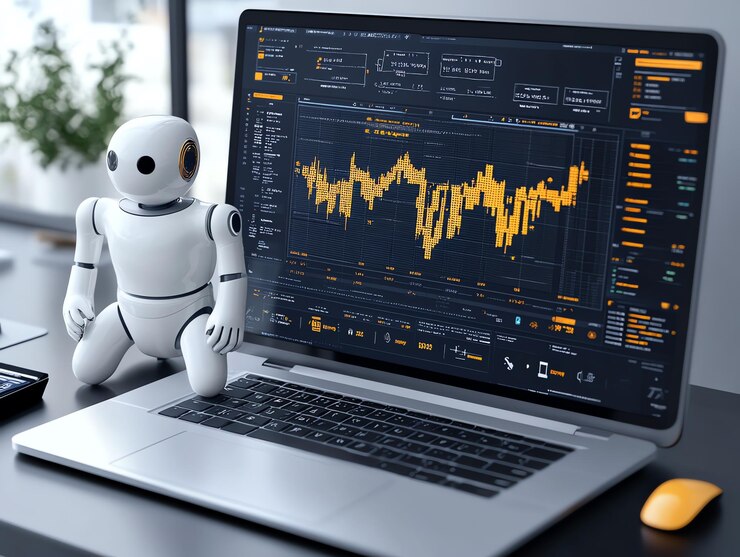In recent years, artificial intelligence (AI) has emerged as a transformative force across various industries, and stock trading is no exception. The world of finance, with its complex and dynamic nature, is increasingly being shaped by AI, which is revolutionizing the way trading is conducted on Wall Street. This article delves into the ways AI for stock trading, the benefits and challenges it presents, and why it is being hailed as the next big thing in the financial markets.

The Evolution of Stock Trading
Stock trading has undergone significant transformations over the past few decades. From the days of floor trading, where brokers physically bought and sold shares, to the advent of electronic trading platforms, technology has continuously advanced the efficiency and speed of financial markets. The introduction of algorithmic trading, where predefined rules are used to execute trades, marked a significant shift in how trading was conducted. However, AI takes this evolution a step further by enabling systems to learn, adapt, and optimize trading strategies in real-time.
How AI is Revolutionizing Stock Trading
AI’s impact on stock trading is multifaceted, encompassing several areas that are crucial to the decision-making process.
- Data Processing and Analysis: One of AI’s most significant contributions to stock trading is its ability to process and analyze vast amounts of data quickly and accurately. Traditional traders rely on a combination of fundamental and technical analysis to make decisions, but the sheer volume of data available today makes it challenging for humans to keep up. AI systems, however, can sift through terabytes of data, including historical prices, financial statements, news articles, social media sentiment, and even satellite images, to identify patterns and trends that might be missed by human traders.
- Predictive Analytics: AI excels in predictive analytics, where it uses historical data to forecast future price movements. Machine learning models, a subset of AI, can be trained on historical market data to predict stock prices with a degree of accuracy that was previously unattainable. These models can identify subtle correlations and anomalies that are not immediately apparent, giving traders a significant edge in anticipating market movements.
- Algorithmic Trading: While algorithmic trading has been around for years, AI-enhanced algorithms are far more sophisticated. These AI-driven algorithms can adapt to changing market conditions in real-time, adjusting their strategies based on new data and market sentiment. This adaptability allows them to execute trades at optimal times, maximizing profits while minimizing risks.
- Sentiment Analysis: Sentiment plays a critical role in stock market movements. AI systems can analyze sentiment from a variety of sources, including news outlets, social media, and financial reports, to gauge the market’s mood. By understanding whether the sentiment is bullish or bearish, AI can make informed predictions about how stock prices might move in the short term.
- Risk Management: Effective risk management is essential in stock trading. AI can assess and mitigate risks by continuously monitoring market conditions and adjusting trading strategies accordingly. It can also help in portfolio management by diversifying investments in a way that balances potential returns with acceptable levels of risk.
- High-Frequency Trading (HFT): AI is also at the forefront of high-frequency trading, where it can execute thousands of trades in milliseconds. These trades are based on algorithms that take advantage of minute price discrepancies that may last only for a fraction of a second. AI’s ability to process and act on information faster than any human trader gives it a considerable advantage in this space.
The Benefits of AI in Stock Trading
The integration of AI into stock trading offers numerous benefits, some of which include:
- Increased Efficiency: AI can process and analyze data at speeds that far exceed human capabilities. This leads to quicker decision-making and the ability to capitalize on opportunities that may be fleeting.
- Enhanced Accuracy: AI’s ability to identify patterns and correlations that are not immediately obvious leads to more accurate predictions and better trading outcomes. It reduces the likelihood of human errors, which can be costly in the fast-paced world of stock trading.
- Cost Reduction: By automating the trading process, AI reduces the need for large trading teams, lowering operational costs. Additionally, AI-driven strategies can be more efficient in executing trades, minimizing transaction costs.
- 24/7 Trading: Unlike human traders, AI systems can operate around the clock without fatigue. This is particularly advantageous in global markets, where trading occurs across different time zones.
- Objective Decision-Making: AI removes the emotional component from trading, which can often lead to irrational decisions. By relying on data-driven analysis, AI ensures that trading decisions are made based on logic rather than fear or greed.
Challenges and Risks of AI in Stock Trading
Despite its numerous benefits, the use of AI in stock trading is not without challenges and risks.
- Overfitting: One of the risks associated with AI, particularly in machine learning, is overfitting. This occurs when a model is too closely tailored to historical data, making it less effective in predicting future outcomes. Overfitting can lead to poor trading decisions when market conditions change.
- Market Volatility: AI systems are highly dependent on data, and sudden, unpredictable events (like geopolitical tensions or natural disasters) can lead to market volatility that AI may not be equipped to handle. In such scenarios, AI-driven trading could exacerbate market movements, leading to unintended consequences.
- Ethical Concerns: The rise of AI in stock trading raises ethical questions about fairness and market manipulation. There is a concern that AI could be used to gain an unfair advantage, potentially leading to market manipulation. Additionally, the widespread use of AI in trading could contribute to market instability if many AI systems act on the same signals simultaneously.
- Regulatory Challenges: The use of AI in financial markets poses regulatory challenges. As AI systems become more prevalent, regulators must ensure that they operate transparently and fairly. This may require updating existing regulations or creating new ones to address the unique challenges posed by AI.
- Dependence on Technology: The increasing reliance on AI and other technologies in stock trading makes the financial system more vulnerable to cyberattacks and technical failures. A malfunction in AI systems could lead to significant financial losses and market disruptions.
The Future of AI in Stock Trading
The role of AI in stock trading is likely to grow even further in the coming years. As AI technology continues to advance, we can expect even more sophisticated trading algorithms that can adapt to an ever-changing market environment. The integration of AI with other emerging technologies, such as blockchain and quantum computing, could lead to new trading paradigms that are faster, more secure, and more efficient.
Moreover, the democratization of AI tools means that AI-driven trading will not be limited to large financial institutions. Retail investors will increasingly have access to AI-powered platforms, allowing them to compete on a more level playing field with institutional traders.
Conclusion
AI is undoubtedly the next big thing on Wall Street, with the potential to revolutionize stock trading in ways that were previously unimaginable. Its ability to process vast amounts of data, predict market movements, and execute trades with unparalleled speed and accuracy makes it an invaluable tool for traders. However, the adoption of AI in stock trading also comes with challenges and risks that must be carefully managed. As the technology continues to evolve, the financial industry must adapt to ensure that AI is used responsibly and effectively, balancing innovation with the need for stability and fairness in the markets. Ultimately, AI’s impact on stock trading will be profound, reshaping the landscape of Wall Street for years to come.






